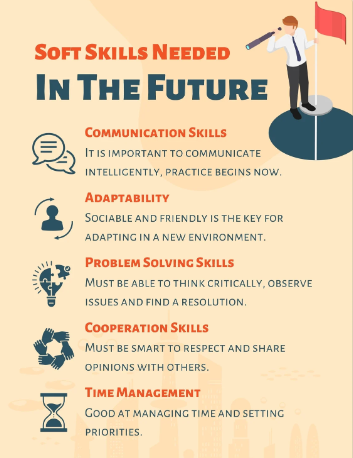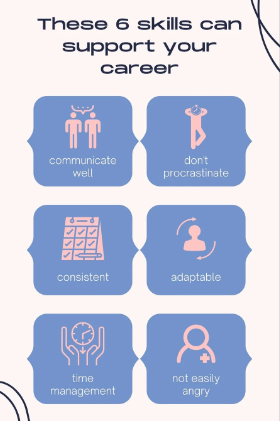Creating a compelling resume as a fresh graduate can be a daunting task, but it’s also your ticket to landing your dream job. One of the key elements that can…

Soft Skills for Freshers: Examples, Importance & How to Improve
Being a fresher, creating an impressive resume might be challenging. Employers look for academic accomplishments when hiring new employees, but they also pay close attention to your soft skills. These skills are just as crucial as your technical skills since they show that you have the teamwork, communication, and flexibility to handle different working difficulties.
In this article, we will explore the top soft skills for resume that can make your resume stand out, helping you land that dream job. Moreover, we’ll introduce the Firstnaukri Resume Maker tool, an invaluable resource to ensure your resume is ATS-friendly and tailored to your desired job’s specific keywords.
What are Soft Skills?
Soft skills are personality traits, social graces, and relationship skills that allow people to interact effectively and harmoniously in their personal and professional lives. Soft skills are often described as “people skills”, as they involve the ability to communicate, manage relationships, work effectively with others, and perform effectively in social situations.

Soft skills are important in all areas of life, but they are especially important in the workplace. In today’s increasingly competitive job market, soft skills can be just as important as hard skills in getting hired and getting ahead.
Some of the most important soft skills for resume include:
- Communication skills
- Teamwork skills
- Problem-solving skills
- Adaptability
- Leadership skills
- Organizational skills
- Interpersonal skills
Why are Soft Skills Important?
Soft skills are important for a number of reasons. They can help you:
- Communicate effectively: This is essential for any job, but it’s especially important in today’s workplace, where more and more communication is done online or through other remote means.
- Build relationships: Strong relationships with your colleagues, clients, and customers can help you succeed in your career.
- Solve problems: Soft skills like critical thinking and problem-solving can help you identify and address problems quickly and effectively.
- Be adaptable: The ability to adapt to change is essential in today’s ever-changing workplace.
- Lead others: If you have leadership skills, you can be a valuable asset to any team.
- Be successful in your career: Soft skills can help you stand out from the competition and get ahead in your career.
If you want to be successful in today’s world, it’s important to develop your soft skills. There are many resources available to help you do this, such as books, articles, workshops, and online courses.
Top Soft Skills for Resume
In today’s competitive job market, it’s more important than ever to have strong soft skills. These are the personality traits and interpersonal skills that allow you to interact effectively with others and get the job done.
For freshers, soft skills can be just as important as technical skills. In fact, some employers even say that soft skills are more important than hard skills for entry-level positions. So, what are the top soft skills for resume that you should highlight? Here are a few of the most important ones:
Communication Skills
The ability to communicate effectively, both verbally and in writing. This includes being able to clearly and concisely convey your ideas, as well as being able to listen actively and understand the needs of others.
- Example: Proficiently conveying complex ideas during team meetings, ensuring all members understand the project’s objectives and tasks.
- Related skills: verbal communication, written communication, active listening, public speaking, presentation skills.
Problem-solving Skills
The ability to think critically and solve problems. This includes identifying problems, gathering information, and developing and implementing solutions.
- Example: Successfully resolved technical glitches during an internship, enhancing the efficiency of the company’s website.
- Related skills: critical thinking, problem-solving, decision-making, and analytical skills.
Read: Logical Reasoning Questions and Answers for Freshers
Adaptability and Flexibility
The ability to adapt to change and learn new things.
- Example: Adapted to changes in project scope and timelines, seamlessly adjusting priorities without compromising on quality.
- Related skills: flexibility, resilience, adaptability, willingness to learn, open-mindedness.
Teamwork and Collaboration
The ability to work effectively with others, share ideas, and resolve conflicts.
- Example: Collaborated with cross-functional teams to develop a marketing campaign, contributing valuable ideas and insights.
- Related skills: collaboration, cooperation, conflict resolution, empathy, teamwork, and delegation.
Time Management

The practice of organizing and arranging how to allocate your time between various tasks is known as time management. Generally speaking, it refers to the capacity to utilize one’s time efficiently or productively, in particular at work.
- Example: Efficiently balanced coursework, part-time job, and volunteering commitments, consistently meeting all deadlines.
- Related Skills: Organization, prioritization, multitasking
Leadership Skills
The ability to motivate and inspire others, set goals, and delegate tasks.
- Example: Led a group of volunteers in organizing a charity event, coordinating tasks, and motivating team members to achieve targets.
- Related skills: leadership, motivation, delegation, decision-making, teamwork.
Emotional Intelligence
- Example: Demonstrated empathy and support to a colleague during a challenging time, fostering a positive and supportive work environment.
- Related skills: emotional intelligence, self-awareness, self-management, empathy, social skills.
The ability to understand and manage your own emotions, as well as the emotions of others.
Creativity and Innovation
The ability to think outside the box and come up with new ideas.
- Example: Proposed and implemented a creative social media campaign, resulting in a significant increase in online engagement.
- Related skills: creativity, innovation, problem-solving, critical thinking, imagination.
Critical Thinking
Being able to reason coherently and see how concepts are related to one another is known as critical thinking. It is primarily a process that entails applying logic and structure to the interpretation of data.
- Example: Analyzed market trends and competitor strategies to propose data-driven improvements to the company’s product lineup.
- Related Skills: Research, data analysis, attention to detail.
Adaptability and Flexibility
Flexibility can be more immediate and situational, typically including the need to accommodate others, whereas adaptability frequently entails anticipating and preparing ahead to account for alternatives.
- Example: Successfully managed a last-minute change in project requirements, ensuring a seamless delivery to the client.
- Related Skills: Open-mindedness, resilience, problem-solving.
How to Highlight Soft Skills on the Resume?
Highlighting your soft skills on your resume is crucial as it helps potential employers understand how you can contribute to their organization beyond technical qualifications. Here are some effective tips to showcase your soft skills for resume:
- Create a section for “Skills”: Your resume should have a section dedicated to displaying your soft skills. You can put this part before your job experience or education and after your resume summary or career objective.
- Use appropriate keywords: Include resume keywords related to soft skills that are consistent with the job description for which you are applying. Use the identical words “effective communication” and “teamwork,” for instance, if those are requirements of the position on your resume.
- Be precise and give instances: Don’t just list soft skills for resume; show how you’ve used them by giving examples of how you’ve used them in actual circumstances. Put these instances in concise bullet points.
- Count your accomplishments: Quantify the effect of your soft skills wherever you can. Mention how, for instance, your ability to effectively communicate resulted in a successful client presentation or how your capacity for problem-solving increased the effectiveness of a certain procedure.
- Tailor your resume for each job application: Based on the specific demands of the job you’re looking for, tailor your soft skills section. Emphasize the soft skills that are most important to the job.
- Use action verbs: To make each bullet point outlining your soft skills more compelling and effective, start each one with a strong action verb. Examples include “led,” “facilitated,” “resolved,” “collaborated,” etc.
- Highlight soft skills in your cover letter: Use your cover letter to explain further context and go into more detail about how your soft skills have contributed to your accomplishments and contributions.
- Showcase soft skills from extracurricular activities: If you lack substantial job experience, highlight soft skills you’ve acquired through volunteering, athletics, clubs, or any other extracurricular activities.
- Don’t overcrowd: While it’s important to emphasize your soft skills, take care not to stuff your resume with too many bullet points. To make your resume short and simple to read, concentrate on the soft skills that will help you the most.
Conclusion
For a fresher to leave a lasting impression on potential employers, having the appropriate soft skills for resume is crucial. Remember to include relevant instances from your academic, extracurricular, or volunteer activities in your resume to demonstrate these talents. Don’t forget to use the Naukri Campus Resume Maker to simplify the process. With its ATS-friendly resume templates and keyword optimization, your resume will stand out amidst the competition and increase your chances of landing that dream job.
So, gear up, start refining those soft skills, and create a compelling resume that reflects your true potential.
FAQs on Soft Skills for Resume
What are the benefits of having soft skills?
There are many benefits to having soft skills. Soft skills can help you:
- Communicate effectively with others.
- Build relationships with your colleagues and clients.
- Solve problems and make decisions.
- Adapt to change and learn new things.
- Be a better leader.
- Be more successful in your career.
How to showcase soft skills on a resume?
Showcasing your soft skills on a resume requires a strategic approach. Create a dedicated “Skills” section and use the right keywords relevant to the job you’re applying for. Provide concrete examples of how you’ve applied your soft skills in various situations, and quantify your achievements wherever possible. Integrate soft skills into your work experience descriptions to demonstrate consistency.
How to demonstrate problem-solving skills on a resume?
To demonstrate your problem-solving abilities on your resume, provide examples of challenges you’ve faced and the solutions you’ve implemented. Quantify the impact of your problem-solving skills by showcasing how your initiatives improved processes or outcomes. Highlight instances where you identified and resolved issues creatively, and mention any recognition or awards received for your problem-solving contributions.
What are the most important soft skills to include on a resume?
Key soft skills include communication, leadership, problem-solving, teamwork, adaptability, time management, emotional intelligence, critical thinking, conflict resolution, and attention to detail. Prioritize skills relevant to your target role.
How should I demonstrate soft skills on my resume?
Incorporate soft skills into your work experience using specific examples and measurable achievements. For instance, “Led a 5-member team to complete project deadlines 15% ahead of schedule” demonstrates leadership and time management.
What soft skills are employers looking for in 2026?
Employers highly value adaptability, remote collaboration, emotional intelligence, cultural awareness, digital communication, resilience, self-motivation, and creative problem-solving in today’s evolving workplace.
Should I list soft skills separately on my resume?
Include a dedicated skills section highlighting key soft skills, but also weave them naturally throughout your experience section with concrete examples demonstrating how you’ve applied these skills.
How many soft skills should I include on my resume?
List 5-7 most relevant soft skills for your target position. Research the job description and company culture to identify which soft skills are most valued by the employer.
How can I prove my soft skills during interviews?
Prepare specific STAR (Situation, Task, Action, Result) stories that demonstrate your soft skills in action. Include quantifiable results and positive outcomes whenever possible.
What’s the difference between hard skills and soft skills on a resume?
Hard skills are technical abilities learned through education/training (programming, writing), while soft skills are interpersonal and behavioral traits (communication, leadership) that enhance workplace effectiveness.
Which soft skills are most valuable for remote work?
Essential remote work soft skills include virtual communication, self-discipline, time management, digital collaboration, adaptability, proactive problem-solving, and independent decision-making.
Can soft skills compensate for lacking hard skills?
Strong soft skills can demonstrate potential and adaptability, making you attractive to employers even with less technical experience. However, they should complement, not replace, necessary hard skills.
How do I improve my soft skills for my resume?
Develop soft skills through volunteering, leadership roles, project management, mentoring others, participating in team activities, and seeking feedback on your interpersonal interactions.
Latest Posts
How To Prepare A CV Online? – A Comprehensive Guide for Students
Creating a well-crafted CV (Curriculum Vitae) is essential for making a strong first impression on potential employers. For college students and freshers, an online CV preparation process can simplify the…
Should Freshers Add a Photo to Their Resume? 2026 Guide
The job application procedure has grown more difficult in the current digital era. Job seekers are always seeking methods to differentiate themselves from the competition and make an impact on…
Best Career Objective and Resume Objective Examples for 2026
In today’s competitive job market, having a compelling career objective can significantly enhance your chances of landing your dream job. A career objective, or resume objective, is a concise statement…
How to Write a Resume for Freshers? – Complete Guide for 2026
Creating a compelling resume can feel daunting as a fresher stepping into the professional world. Your resume is your first impression, a key to unlocking interviews and job offers. However,…
Popular Posts
100+ Quantitative Aptitude Questions for Placement with Answers
Quantitative aptitude questions play a crucial role in campus placements, competitive exams, and entry-level job interviews. Whether you are preparing for your first job interview, an aptitude test for placement,…
How to Start an AI Career in India: Skills and Future of Work
Artificial Intelligence (AI) is revolutionizing industries worldwide. From automating routine tasks to enabling self-driving cars and intelligent healthcare diagnostics, AI is reshaping the future of work. For college students and…
How to Write Mail for Job Application – Explained
A job application email is a professional email that you send to a potential employer to express your interest in a job opening. It is typically accompanied by your resume…
Google Internship 2026 for Freshers: All You Need to Know
In the competitive landscape of technology careers, a Google internship stands out as a golden opportunity for aspiring professionals. Whether a college student or a recent graduate, securing an internship…
How to Write a Job Application Letter (With Samples)
When it comes to applying for your first job, making a great first impression is crucial. As a recent graduate, you might feel a little intimidated by the idea of…
